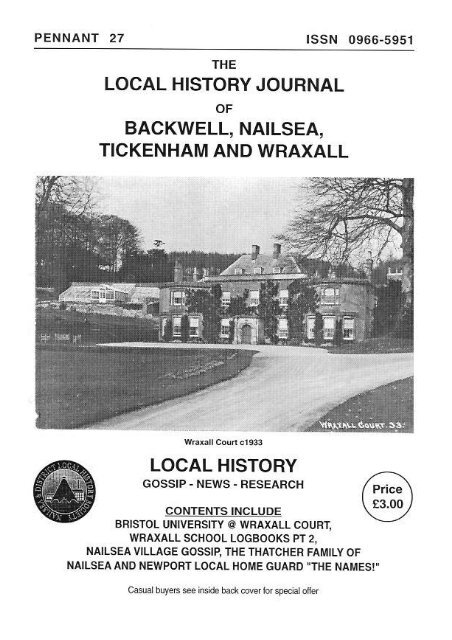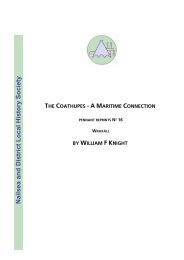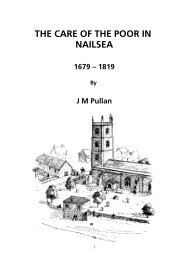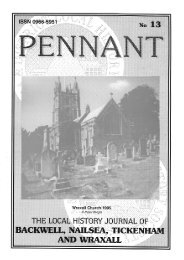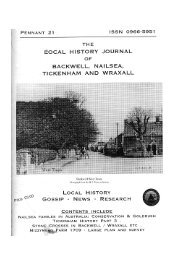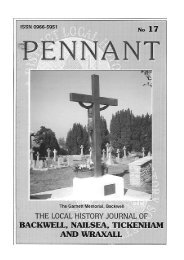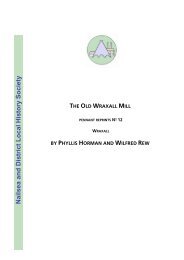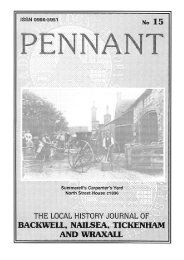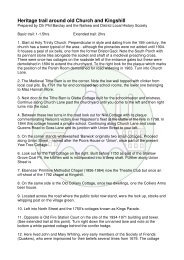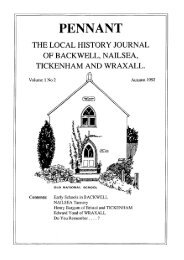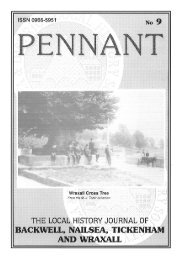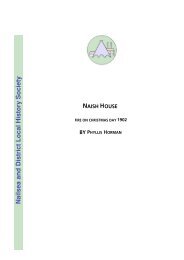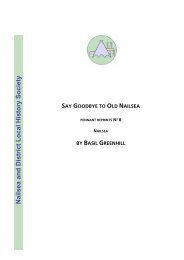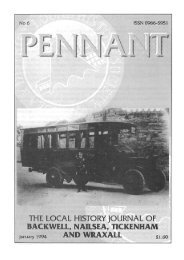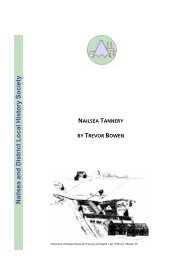No 27 - Nailsea and District Local History Society
No 27 - Nailsea and District Local History Society
No 27 - Nailsea and District Local History Society
You also want an ePaper? Increase the reach of your titles
YUMPU automatically turns print PDFs into web optimized ePapers that Google loves.
This ebook version, © The respective authors <strong>and</strong> <strong>Nailsea</strong> & <strong>District</strong> <strong>Local</strong><strong>History</strong> <strong>Society</strong>, PO Box 1089, <strong>Nailsea</strong> BS48 2YP, has been made available inApril 2010, so that an individual may download <strong>and</strong> read this document, forprivate research purposes only. It must not be reproduced or passed to a thirdparty without written permission of the copyright holders
The ’Bus to WraxallThe following article is a slightly abridged extract from the Autumn 1999edition of “<strong>No</strong>nesuch” the University of Bristol Magazine. It is printed herewith the permission of the University of Bristol.)Reality was certainly harsh during the war (see <strong>No</strong>nesuch spring 1995), <strong>and</strong>the privations continued into the ‘50s. Students who lived in Wraxall Court,however, shared experiences that were unique to this country house as thesegraduates rememberWilliam Bennett 1949To meet the post-war expansion in the University’s student population theUniversity rented a country house known as Wraxall Court which had beenused during the war as a convalescent home for naval officers. Some of thebedrooms had been divided into cubicles to accommodate several servicemen.coverlets on the beds still bore the naval insignia, an anchor in blue thread.Early in October 1946 the first intake of undergraduates arrived.Even though it was several miles from Bristol <strong>and</strong> residence was more costlythan lodgings in Bristol, some students preferred to live there during all threeundergraduate years. They valued life in the countryside, the quietness, theviews across the Somerset ‘levels’ to the distant Quantock Hills, the appleorchards in springtime, the autumn hints of leaves on the trees behind thehouse itself.There were very few street lights in the small village so we had to rely ondomestic lighting or h<strong>and</strong> torches to find our way about in the darkness.However, the bright lights of the house were an attraction for the large blackinsects which bred in the ‘levels’ in spring <strong>and</strong> summer time <strong>and</strong> zoomedtowards the bedrooms. Moreover, the sight <strong>and</strong> unpleasant smell of applesrotting in the yard of Coates’s cider Factory on the outskirts of nearby <strong>Nailsea</strong>was enough to put at least one person off drinking cider for life.Those early weeks were not without their particular inconveniences. there wasinsufficient crockery <strong>and</strong> cutlery to last a whole dinner, so half-way throughwe had to wash up some of what we had just used in order to finish themeal.
When we had first arrived we were told that food supplies had not been fullydelivered so our first dinner was Spam <strong>and</strong> boiled runner beans followed by aplate of cornflakes. The cook had been a blacksmith in a Canadian lumbercamp prior to coming to Wraxall. We learned later that his best dish waspancakes <strong>and</strong> syrup; it made a welcome change from a sweet consisting offour dried prunes on a plate! Food of course was still on coupons <strong>and</strong> notalways in ample supply.Life in spartan conditions had its compensations: long walks, sometimes overthe Suspension Bridge, through Leigh Woods <strong>and</strong> Fail<strong>and</strong> back to Wraxallafter lectures on Saturdays, or west from Wraxall to ‘Cadbury Camp’ or to dosome shopping in <strong>Nailsea</strong> which was a long straggling village in those days,<strong>and</strong> nothing like the dormitory suburb it has since become.Being so far from Bristol we looked locally for entertainment. On Friday nightsa group of people met in a private house to listen to classical music; theycalled themselves “The Wraxall Recorded Music <strong>Society</strong>”; the company, music<strong>and</strong> refreshments were very good. The local vicar would sometimes comebringing his chess board to entice anyone to play, but often we found we hadmore pressing studies to do or pursuits to follow! However most of thestudents involved themselves in the monthly discussions led by a distinguishedguest who came to dinner <strong>and</strong> then talked informally in the common room.Amongst those who came were the Bishop of Bristol, Sir Philip Morris, Prof.Mott <strong>and</strong> Prof. Pugsley.During RAG week we tried to collect money from the villagers in Wraxall <strong>and</strong><strong>Nailsea</strong> but after the first year’s experience decided to discontinue. Thevillagers had little knowledge of mad-cap students, so the police <strong>and</strong> wardenwere soon besieged with frantic ‘phone calls <strong>and</strong> complaints.A group had approached one particularly well-lit house, knocked on the door,<strong>and</strong> were confronted with the terrified cry, ‘Good God, no’, from a little manalso dressed in unusual clothes: we had stumbled on the monthly meeting ofthe local Freemasons.The undergraduates were a very mixed bunch, perhaps more so than pre-waror today: this variety enhanced the experience of each of us, especially thosewho had come straight from school <strong>and</strong> had little knowledge of life ingeneral. Some were already married with families living elsewhere; some wereengaged.
Several had seen active service in various areas of combat; most were anxiousto get a good degree as soon as possible which would enable them to settleinto a more normal life than they had known during the war years.<strong>No</strong>t all were British: there was a Malaysian; two were from the continent ofAfrica; another was a socialist refugee from communist controlledCzechoslovakia who had barely escaped with his life across the frontier <strong>and</strong>had to leave behind his wife <strong>and</strong> baby daughter until such time as they tomanaged to get out. The daughter for a while became the only femaleamongst the body of students. Each week until the end of the first term anex-army sergeant used to don his uniform to go <strong>and</strong> collect his pay; he wasstill technically in the army.It was difficult to get fuel for vehicles taking part in the RAG parade so on oneoccasion we had a wagon hitched to a farm tractor which used paraffininstead of precious petrol <strong>and</strong> drove slowly all the way into Bristol, in theParade, <strong>and</strong> back to Wraxall.Looking back from a distance of 50 years one wonders where all that firstintake of Wraxallians are now.Michael Griffith (BSc 1950)I went to Bristol in October 1946 straight from war service in the Royal Navywith a view to reading Geography <strong>and</strong> becoming a teacher.I was delighted to be told that I had a place in a new Hall of Residence calledWraxall Court. The snag was that it was eight miles from Bristol, on the roadto Clevedon, but there would be a coach laid on by the University to take usto lectures in the mornings, <strong>and</strong> bring us back after laboratories in theafternoons.I well remember waiting that first day for the coach which took us outthrough Long Ashton into the delightful village of Wraxall.There was our new home, <strong>and</strong> very splendid it looked from the outside, butthere was not a lot inside. We were greeted by the warden, Mr J.K.Sutherl<strong>and</strong>, <strong>and</strong> were told that at first things would be pretty basic, as indeedthey were.
We were a mixed bunch of about 30 students, mostly straight from schoolbut with a ‘leavening’ (if that is the right word) of ex- servicemen like myself.There were few single rooms <strong>and</strong> I found myself sharing with two young ladsstraight from school (George Ardley <strong>and</strong> Howard Brooks). We soon shookdown <strong>and</strong> made the best of it. The main grumbles were over food as therewas still rationing, <strong>and</strong> we were always hungry (George Ardley’s family usedto send him Cornish pasties which were much appreciated by Howard <strong>and</strong>myself). George Wignall was ex- army <strong>and</strong> was our first senior student. He gota room to himself, which was a blessing as he smoked a very smelly pipe.I was elected senior student in my second year, <strong>and</strong> really enjoyed the social aswell as the academic life. The problem was getting back to Wraxall after adance at the Victoria Rooms or in fact any other activity after the 5.15 pmcoach left. Buses did not run very late in those days, <strong>and</strong> many of us had towalk several miles in the dark either from the railway station at <strong>Nailsea</strong> or thejunction where the Weston-Super-Mare ’bus left the Clevedon road.I was entitled to a third year at Wraxall, but decided to postpone it until myeducation year, which was a mistake as by then the whole ethos of the placehad changed. We were no longer pioneers blazing a trail in unexploredSomerset; things were civilised; we had to wear gowns for dinner.Bernard R. Hillier (BA 1951)Whatever my objectives as a sixth-former, unforeseen events were to lead to afortuitous change to my plans. Instead of continuing with my educationimmediately after leaving school in 1945, I found to my consternation thatalthough the war was over young men of my age were still being conscriptedinto military service. I spent the next two-<strong>and</strong>-a-half years as an NCO in theIntelligence Corps, which in fact helped me to come of age <strong>and</strong> accept greaterresponsibilities.The prospect of an FETS grant removed any concerns regarding whether Icould afford to go to university <strong>and</strong> I was only to glad to take advantage ofthe opportunity on offer.During my time at Bristol a frequent topic of conversation was whether exservicestudents derived more benefit from their studies than their colleagueswho had gone to university straight from school. I personally felt that as far as
examination grades were concerned there was a distinct advantage inuninterrupted studies through school <strong>and</strong> university. examination grades,however are not everything. I found that three years away from formal studiesprovided an opportunity to take stock of myself <strong>and</strong> to decide what generaldirection I wished my career to take.In the early post-war period many people, <strong>and</strong> particularly those who hadfought overseas, earnestly believed that Britain should move quickly to a morejust <strong>and</strong> egalitarian society. While I was still in the army I had formed the viewthat, keen lad as I was, I might eventually find some minor role in helpingbring such a Utopia to reality in Britain. The study of Economics, I thought ,would be a move in the right direction. Consequently, in the autumn of 1948I caught the ‘bus to Bristol to begin my university course in Economics.In 1948 the University had a student body of only little above 2,000 studentswith relatively few women students. Social life tended to focus on the ratherelegant Victoria Rooms, which housed the Student Union, <strong>and</strong> most of ourclasses were conducted in the even more impressive Wills Memorial Building.Economics was not then a widely popular subject <strong>and</strong> there were only three ofus taking the course known as ‘ Special Economics’. Most of our classes wereshared with five students who were taking a joint-school course in Philosophy<strong>and</strong> Economics, <strong>and</strong> in practice we tended to regard ourselves as one eightstronggroup.The Head of the Economics Department, H.D.Dickinson, was a born academicbut one who also had the gift of being able to mix on easy terms with hisstudents. Without doubt he is the person who made the greatest impressionon me in my three years at Bristol.For the first two years of my time I lived at Wraxall Court. I had an enjoyabletwo years there, before moving into digs in Clifton for my finals year. <strong>Nailsea</strong>is best known to most people as the source of blue* glassware now eagerlysought after by collectors. To myself, <strong>and</strong> probably to some of my old Wraxallfriends, it is better known as the location of a cider mill which kept the <strong>Nailsea</strong>pub well supplied with scrumpy.On one occasion Wraxall Court entered a float to the RAG procession on thetheme of ‘state pubs’. A more memorable effort, however, was made byanother group of students who staged a week-long athletic feat of some
magnitude. A stalwart in their ranks with the resounding name of ‘IgotKrampad’ undertook to swim across the Atlantic <strong>and</strong> to time his arrival atBristol docks to coincide with the commencement of RAG week. Dailybulletins were posted to record his progress, e.g. ‘Igot sighted swimmingstrongly in an easterly direction off the Azores’.My thoughts are frequently with Bristol <strong>and</strong> the west country generally, <strong>and</strong> Iwas delighted when a Branch of Convocation was established in Auckl<strong>and</strong> foralumni in the north isl<strong>and</strong> of New Zeal<strong>and</strong>.(*Editor of Pennant - I have to correct Bernard’s memory. Bristol is famed forits Blue Glass; <strong>Nailsea</strong> for its Green.)The editor’s thanks go to the University of Bristol for allowing the article to bepublished in Pennant <strong>and</strong> for putting the <strong>Society</strong> in touch with the threecontributors named above.Thanks are also due to Jonathan Harlow Secretary of ALHA for bringing it tothe editor’s attention.The illustration on page 3 comprising part of the article in ‘<strong>No</strong>nesuch’ appearswith the permission of the University of Bristol.
Wraxall Boys’ School Log Books Part 2Compiled by Phyllis HormanAfter the death of Mr. Carne, Mr. Studdle became the next master <strong>and</strong>although he was not certificated as such at the time (he was classed as 4th.class, 1st. grade) he seems to have taught well <strong>and</strong> kept the boys underreasonable control. June 4th. 1867 "Attendance better, (there had been aspell of very wet weather) William Griffin struck in the head by a stone thrownby F. Reed. Cautioned the boys to abstain from such sports, <strong>and</strong> took F. Reedhome for his parents to punish him" so it would seem that he wasn't one tokeep using the cane as punishment.Around this time several of the boys were absent without leave, thepunishment being that they were kept in school for an extra hour but if itshould happen too frequently, their names were taken off the registers, thenthey, or more likely their parents, would have to apply for them to be reinstated.The number of boys on the registers at this date was 57, mostparents paid a few pence a week for their children’s education therefore theywould want to get their monies worth. For those who couldn't afford to pay,(the children were written as "pauper children") the fees were paid by thePoor Rate through the Relieving Officer.The weather during July <strong>and</strong> August 1867 was very unsettled, <strong>and</strong> on July25th."Cautioned the boys against making a mess with the water pump, forbadethe boys going to the pump without leave from me.” There was probablyenough rainwater without adding to it!By January 6th. 1868 Mr. Studdle was getting concerned about thelatecomers, "I have not paid attention enough lately to the punctuality of theboys consequently several of the more dilatory ones are generally late, thismust be stopped. I gave notice to this effect to the boys today.” As if hehadn't enough problems, February 21st. "School thrown into confusion bythe sudden accidental death of Mrs. Price my housekeeper this morningearly.”In June <strong>and</strong> July the weather had become very hot <strong>and</strong> on July 24th. Mr.Studdle remarked "Rev. E.P. Vaughan called <strong>and</strong> gave a lesson. The schoolwas closed today for 3 weeks for the usual Midsummer Vacation. the school
work during the past fortnight has been very unsatisfactory on account of thegreat heat.” After the return to school there was still the problem with theboys arriving late or not at all September 21st. "Removed the names of twoboys, W. Rew <strong>and</strong> A. Adams from the registers on account of the irregularityof their attendance.” William Rew was my gr<strong>and</strong>father.Mr. Studdle was determined to better himself as on December 14th. "<strong>No</strong>school, Master absent attending the Certificate Examination at St. Mark'sCollege, Chelsea"At the start of 1869 there were 60 names on the registers <strong>and</strong> onJanuary14th. "One new boy, Edward Youde.” He was the youngest brotherof my other gr<strong>and</strong>father John Youd, <strong>and</strong> he seems to have been a very brightlad with his lessons. As he was born in 1859 it would be presumed he hadstarted school elsewhere, it may have been Clapton in Gordano. My cousinDavid Youd wrote an article about Edward in "Pennant" Vol. 1 no. 2. entitled"Edward Youd of Wraxall. Drowned off Cherbourg. 1880.”During 1869 several boys left school to start work, or because of irregularattendance their names were taken off the registers, but August 2nd. "Reopenedschool. 47 names upon the registers. The school is very low just nowin consequence of the loss of nearly all the <strong>Nailsea</strong> children who have leftwhile their fathers are thrown out of work by the closing of the Glassworks",however, on August 30th. "Several of the boys from <strong>Nailsea</strong> have returned toschool being paid for by the Distress Committee.”On September 29th. Mr. Studdle tendered his resignation which wasaccepted. December 20th. <strong>and</strong> 21st. "Master absent attending theCommittee of Trinity School, Maidstone, relative to the election for a Masterfor that school. Mr. John Hall jr. kindly carried on the school during these twodays", <strong>and</strong> on December 24th. "School closed for Xmas holidays, 1 week,boys dismissed at 3 o'clock. This day my duties as Master of Wraxall Boysschool terminate. Boys presented me with a writing desk as a parting gift.Rev. E.P. Vaughan called.” T. Studdle.The first entry 1870, January 3rd. "Began school with 37 present, 62 on theregister, 47 present today (which reads rather peculiarly). Unable to write incopy books for want of ink.” This must be where Mr. Colchester commencedas master, <strong>and</strong> it would seem he had a lot of work before him. January 5th."45 present. Examined 1st. <strong>and</strong> 2nd. classes in Scripture <strong>History</strong> - some
answered well - others scarcely at all, must endeavour to mend this", <strong>and</strong> thenext day "44 present. Gave first two classes a lesson on the life of Solomon,<strong>and</strong> endeavoured to get answers from the boys to whom the questions wereput, <strong>and</strong> with rather better success than yesterday", so he was on the righttrack. It must be mentioned however, that the ages of the boys ranged frominfants to leaving age, 12 to 14 years, <strong>and</strong> there was only the one room inwhich to teach them all, with no division to separate the classes.The weather was cold, January 18th. "Very cold - found the boys st<strong>and</strong>ingabout during playtime - taught them the game of "Fox <strong>and</strong> Geese" to warmthem.” The boys were also taught Drill which they seemed to enjoy, so thattoo must have warmed them up ! On February 1st. two new <strong>Nailsea</strong> boyswere admitted, Harry Ponsford <strong>and</strong> H. Windmill. By the 8th. "A pitched battleyesterday between D King <strong>and</strong> H. Ponsford, two <strong>Nailsea</strong> boys (in the field) -Gave a lesson today on Cain <strong>and</strong> Abel.” Oh dear, was it the <strong>Nailsea</strong> boys wholiked to fight? In the of February there was sickness about which was stillcausing a lot of absentees into April. The boy who was the paid monitor wasabsent as there was sickness in the house, at the annual school inspection 11were absent through sickness. By April 8th. 13 boys were absent throughsickness, others from potato planting, <strong>and</strong> on April 13th. "29 present. WilliamDavey (paid monitor) died yesterday of fever. Resquiescat in pacem.” May2nd. to the 22nd. "School practically closed on account of Scarlet Fever. Twodeaths, William Davey <strong>and</strong> Walter Jones. The visit of H.M. Inspectorpostponed till the 10th. June.” <strong>No</strong>t a good start for the new year or the newmaster, <strong>and</strong> it wasn't till June 28th. that there were 50 boys present, thehighest number since February.On July 14th. came the report of a Drawing Examination. Of the 40presentable, 18 were present, the rest being absent from Fever. Of these 5were satisfactory, 6 proficient <strong>and</strong> 1 excellent, with a prize, this was Chas.Burge for Model Drawing. Mr. Barry's report of the school was "Both schoolshave suffered from an unusually severe attack of fever. A new master has notlong been appointed. The discipline is good. Holy Scripture of 108 questions71 were answered by the scholars to whom they were addressed. Catechism26 of 51. Geography 30 of 42. Considering the circumstances very fairprogress has been made in elementary subjects.” E.P. Vaughan. The otherschool mentioned would have been the girls school.It was a very hot <strong>and</strong> oppressive summer again. On July 22nd. "Average forthe week 47. Present at all 54. <strong>No</strong>. on registers 60. School all excitement
today to see the Funeral of Mr. Gibbs son <strong>and</strong> nephew. Broke up today forMidsummer Holidays 3 weeks" I cannot remember being excited about afuneral when I was at school, in fact, if we were out with mother <strong>and</strong> afuneral procession came by, we stopped <strong>and</strong> bowed our heads until they hadpassed.When the school re-opened, several of the boys had left presumably to startwork, <strong>and</strong> J. <strong>and</strong> T. Malcolm (glassworkers sons) left, with their friends forSunderl<strong>and</strong>. September 2nd. William Rew was sent home again for irregularityafter being cautioned, but on the 6th. he was re-admitted on a promise ofattending more regularly. In October some boys were away potato picking,apple picking <strong>and</strong> helping with cider making.<strong>No</strong>vember 2nd. began fires for the winter, a holiday on the 8th. on theoccasion of the opening of an organ in Wraxall church, to which the masteradds "Red letter day.” <strong>No</strong>vember 10th. "Made out Government returnapropos of the New Education Act (1870)", <strong>and</strong> except for the fact that Wm.Eyres was kept in to sweep as punishment for not sweeping on Saturday, ranaway from school, but two days later he did his sweeping, <strong>and</strong> everything elsewent quite well for the rest of the month. December began with cold <strong>and</strong> wetweather, there was a half holiday on the 8th. <strong>and</strong> a day's holiday on the 9th.for the Clothing Club which was held at the school. On the 12th. "42present. Very cold <strong>and</strong> the furnace doesn't draw well when most needed -wind up. All excitement on the 22nd. 39 present. Partial eclipse of the sun 11to 11-38. Very well seen <strong>and</strong> great interest in by the boys - gave them someexplanation of the phenomena.” On the 24th. "Only 29 present, cold intense15 degrees of frost. Average for the week 34. Broke up for the ChristmasHolidays (fortnight).”Corrections to Pennant 26“Up at the House” Article by Stan Hydep23 col 2 para 1 line 6 should read “both girls, Maude <strong>and</strong> Margaret, sisters I”p25 final paragraph re John Evans should commence “My great gr<strong>and</strong>father”.
“<strong>Nailsea</strong> Village Gossip”More from the book of the same name by Phyllis HormanMarch 1867Ann Hedges of Wraxall, fined 18s. including costs - the loaf was 2oz. short.Richard Elverd, grocer of <strong>Nailsea</strong>, fined 18s. including costs - the loaf was 2oz.short.April 1867John Melborne pleaded guilty to stealing three glass tiles at <strong>Nailsea</strong>, theproperty of his master Mr Bowen, <strong>and</strong> was sentenced to fourteen daysimprisonment.May 1867William Biffen of <strong>Nailsea</strong>, chemist <strong>and</strong> druggist having been judged bankrupton the 11 th . of May 1867, a public sitting for the said bankrupt to pass his lastexamination <strong>and</strong> make application for his discharge will be held at the saidCourt in Bristol on the 19 th of June 1867.Oct 1867Mr Lippiatt a beerhouse keeper in <strong>Nailsea</strong> found George Pullen in his gardencutting cabbages. P.C. Chambers was informed <strong>and</strong> went to Pullen’s lodgingsbetween ten <strong>and</strong> eleven the same evening. Taking Pullen to the station theymet Frederick Hunt <strong>and</strong> John Birch, who said he should not take Pullen. P.C.Chamberlain came to assist. Hunt <strong>and</strong> Birch then tried to rescue Pullen. P.C.Chamberlain threw Hunt to the ground. Hunt drew a pistol <strong>and</strong> deliberatelyaimed at Chamberlain, but fortunately the pistol didn’t fire although it wasloaded. The P.C. also found an open knife in Hunt’s pocket.Birch struck Chamberlain violently on the forehead <strong>and</strong> kicked him severaltimes. P.C. Chambers was also assaulted.The officers succeeded in taking the three men into custody. Hunt <strong>and</strong> Birchwere rem<strong>and</strong>ed in custody until Petty Sessions a few days later <strong>and</strong> Pullen wassummoned to answer the charge of theft of the cabbages. Hunt was a wellknown character having been convicted several times <strong>and</strong> imprisoned for six
years for felony.At the Petty Sessions (the name Birch is now written as Burge) William Brown,Robert Smart <strong>and</strong> Sarah Thompson were also charged with assaulting P.C.Chamberlain. It appears that, when the officers got Pullen to the lock-up, anumber of people were waiting there, among them the other prisoners. Huntsaid ‘You are not going to lock Pullen up’ <strong>and</strong> the fight began. Pullen brokeloose, ran away <strong>and</strong> was caught again. The gun used was rusty <strong>and</strong> onunscrewing the barrel a vice had to be used, but never the less it was loaded.Brown, Smart <strong>and</strong> Thompson were found guilty of assaulting the constables,Brown fined 5 <strong>and</strong> costs, or in default, a month’s imprisonment. Thompson<strong>and</strong> Smart 3 each or eleven days, Hunt committed for trial for intent to bodilyharm. Burge (Birch) was given an otherwise good character by someone inCourt, was charged with assault but was given bail, 20 himself, <strong>and</strong> twosureties of 40 each. Mr Thatcher of <strong>Nailsea</strong> became one of the sureties. At aWestern Circuit in Dec. a former conviction for felony was proved on Hunt<strong>and</strong> he was sentenced to twelve years penal servitude.The amazing thing about this case is, except that Pullen, the originator of thistrouble was summoned to answer to the theft of the cabbages, nothing moreis mentioned of him whether he was fined or what sentence he may havehad.July 1868At a slaughter house in Membry’s Court, Temple Street, Bristol on 11 of June,John Cann, butcher, had six calves. Cornelius Shepstone, 38, butcher (of<strong>Nailsea</strong>) helped to load them in a cart for the cattle market <strong>and</strong> he advisedCann to send only four out of the six. However, he took five <strong>and</strong> left onebehind.When Cann arrived back he found the sixth calf gone. Cann went to seeShepstone about it, he denied having it <strong>and</strong> went to several slaughter houseswith Cann to look for it. Shepstone had sold it for 10s. after having asked17s. to a Mr Harding of Butcher’s Row <strong>and</strong> Cann identified it as his.In cross examination at Court, Cann admitted that he was out on ticket ofleave after serving penal servitude for killing a child. He had also beenimprisoned for stealing a sheep <strong>and</strong> for threatening a constable. In cross
examination (again) Cann admitted that he <strong>and</strong> Shepstone bought the calvestogether at <strong>Nailsea</strong>. Shepstone said - ‘It was as much mine as his’.The jury convicted the prisoner, someone in the gallery crying out ‘That’s anunfair verdict’, sentence four months hard labour.Oct 1868Long Ashton Petty SessionsGeorge Hodge of <strong>Nailsea</strong> was charged with negligently driving a horse <strong>and</strong>cart at <strong>Nailsea</strong> causing injury to a lady <strong>and</strong> pony. The case was withdrawnwith Hodge paying 5s. to the Bristol Infirmary.July 1869Emily Vowles aged thirteen pleaded guilty to stealing two legs of mutton <strong>and</strong>other articles (how did she manage to conceal it?) from Mr Bryant’s butcher’sshop, <strong>Nailsea</strong>, <strong>and</strong> was sentenced to twenty one days imprisonment <strong>and</strong>afterwards to three years at a Reformatory.July 1869On Mon. evening last, at <strong>Nailsea</strong>, P.C. Chambers went to bathe at BackCutting near the railway. One side is rather deep <strong>and</strong> as he couldn’t swim hewas drowned before anyone could help. Unfortunately his wife <strong>and</strong> daughterwere not far away when the accident happened.1869/70Sheep Stealing at TickenhamCornelius Shepstone alias Shippy a butcher of lowest class, <strong>and</strong> AlfredRawlings were charged with having on the 16 th . July stolen or killed a sheepwith intent to steal it from Mr William Dyke Green, farmer of Clevedon. MrW D Green rented three fields at Tickenham containing twenty two sheep.Rawlings was working for him on day work.Rawlings was sworn in <strong>and</strong> stated that on the morning in question Shippywho was working in the next field called him over for a drink of cider, <strong>and</strong>they stayed nearly all day, drinking.Shippy said ‘How would it be if we killed one of the sheep <strong>and</strong> threw it in a
ditch?’ So they went into the next field, caught one of the sheep <strong>and</strong> Shippythrew it to the ground <strong>and</strong> nearly choked it with his fingers <strong>and</strong> thumb, <strong>and</strong>before it was dead he threw it in the ditch. Then he said ‘Stick him in thewater <strong>and</strong> he’ll bleed well <strong>and</strong> it will be all the better.’ The sheep was left inthe water for a short while then taken out.Shippy, who was in the next field suggested throwing it back in the water,someone whose name was believed to be White, did so. Rawlings went away<strong>and</strong> fell asleep, so he didn’t see who cut the sheep open <strong>and</strong> hung it on atree. Shippy accused Rawlings of committing the whole offence <strong>and</strong> said thatRawlings pressed him several times to buy sheep, but he wouldn’t. Rawlingswas very drunk. Prisoner was committed for trial, bail being refused.June 1879Dreadful Fatality at <strong>Nailsea</strong>Yesterday morning two men named George Hills <strong>and</strong> Charles Day, engaged insinking a well on the farm of Mr Grey, <strong>Nailsea</strong> Batch, were suffocated. Itappears that the well, which had been partly sunk, had been ab<strong>and</strong>oned, <strong>and</strong>the two men having undertaken to complete the job, Hills without taking theusual precautions, descended the well. He was down some time when,receiving no response to calls made, Day was lowered to find out if anythinghad happened. Day did not given any sign <strong>and</strong> was drawn up, when he wasfound to be insensible, <strong>and</strong> shortly afterwards expired. The body of Hills wasrecovered some time after. An inquest will be held.Final thoughts on <strong>Nailsea</strong> Village Gossip by Phyllis HormanMy thatched cottages <strong>and</strong> quiet law-abiding countryfolk have vanished completely as far as<strong>Nailsea</strong> is concerned. The five minute chat over the gate must have lasted much longerthan I thought with all these happenings. I wonder if other villages have had such an eyeopener? Oh well, we all have our faults. We may covet our neighbours possessions, evenhis cucumbers <strong>and</strong> cabbages. We can all fly off the h<strong>and</strong>le at times, though not quite soviolently, we hope!These are only a few of the cases, there are a great many more, some utterly ridiculous,some humorous <strong>and</strong> some very, very sad. However, these carefully preserved newspapercuttings do away with one story which we have been told. allegedly, the village fightswere mainly between the colliers <strong>and</strong> glassworkers, now we see it is not necessarily so,there is not one account over this period of men from these two industries fighting enmasse. Maybe they have been blamed far too much, perhaps they weren’t swornenemies after all!
The Thatcher Family (<strong>Nailsea</strong> <strong>and</strong> Newport) <strong>and</strong> theirrelations.Compiled by Peter Wright from information providedby Mrs Jacqueline Clark (née Thatcher), Phyllis Horman <strong>and</strong> Eileen Johnson(When I first came to <strong>Nailsea</strong> in 1976 <strong>and</strong> became interested in local history I foundthat the name of Thatcher was well known <strong>and</strong> well respected in the ‘village’. It wasonly about a year ago that I came across a bundle of photographs in the <strong>Local</strong><strong>History</strong> archive that related to a Thatcher family with the name <strong>and</strong> address of MrsJacqueline Clark. It is thanks to her kindness in supplying further information <strong>and</strong> toPhyllis Horman who had been in contact with a Thatcher descendant in Canada thatI have been able to compile this article. Near the end is a list of all the ‘hatches,matches <strong>and</strong> dispatches’ recorded locally that Phyllis has been able to trace. Furtherinformation from readers about the family, the brewery etc would be appreciated.EDITOR)PART 1.“The Thatchers, the Farlers <strong>and</strong> a house called " Trostry"”by Phyllis Horman.Previously published in Pennant <strong>No</strong> 13 what follows is an edited version:-I was sorry to learn recently of the death in Canada of Mrs Thatcher whosefather in law was Herbert Edwin <strong>and</strong> whose ancestors were the Thatchers of<strong>Nailsea</strong> who started the brewery <strong>and</strong> caused the Friendship Inn to be built.Tony, (their son) who wrote to tell me of her death, was interested in thefamily history. I met him he came to Engl<strong>and</strong> recently. Tony's mother hadbeen keen to find a house (built in Wraxall for her husb<strong>and</strong>'s parents) whichhad been named "Trostry.” She had seen it many years ago but had forgottenthe exact location.Tony remarked in one of his letters "Thinking about "Trostry" mygr<strong>and</strong>father (Herbert Edwin) lived for a number of years around the turn ofthe century in Newport, Mon. running the other Thatcher Brewery onMountjoy Street. I see that there is a street called Trosty in Newport not farfrom the Brewery <strong>and</strong> I wonder if the name originated there...." In the sameletter he also said "Regarding the Farlers, we hold a photograph of JohnFarler who was reputedly the governor (or on his staff) of Zanzibar. He iswearing a fez <strong>and</strong> (it) was taken last century. I wonder if he was the eldestson of John Farler of Coal Pit fame. Another little mystery!"
..... I pointed out the corner of Christ Church where many Thatchers <strong>and</strong>Farlers are buried <strong>and</strong> where the brewery <strong>and</strong> water tower had been <strong>and</strong> thenHeath House.At Holy Trinity Church we found the Thatcher great gr<strong>and</strong>parents grave withother members of their family buried with them. Next we went to Farlers Endto see the tower of Farlers Pit. On to Rosemount now Trendlewood Housewhere John Farler <strong>and</strong> family lived. Unfortunately this is almost impossible tosee. We then went to Wraxall where Tony had found his gr<strong>and</strong>father’s grave3 years earlier <strong>and</strong> then up Tower House Lane as this seemed the most likelyarea to look for "Trostry" ... (It seemed likely that "Sunrise" might have been"Trostry")PART 2.The Thatcher family (Wales)by Jacqueline Cecile Clark (née Thatcher)My Early RecollectionsI remember trips to Weston-super-Mare taken by paddle steamers fromNewport. Staying with my gr<strong>and</strong>mother Selina <strong>and</strong> her two spinster daughtersat ‘Montrose’ Kewstoke Road. There was a lovely park, close to the houseoverlooking the sea with fish ponds <strong>and</strong> pleasant walks, where I was taken asa small child. The house was rather gloomy. I remember feather mattresses<strong>and</strong> the bed high off the ground. My gr<strong>and</strong>mother died when I was about 6years old. Many years later I visited WSM with my mother <strong>and</strong> husb<strong>and</strong>(Aubrey Clark, an architect) <strong>and</strong> found the house quite unchanged.The Breweryknown as Thatchers Bristol Brewery Newport Monmouthshire .I remember the brewery quite well, especially the smell of beer brewing -peering into large vats of beer <strong>and</strong> nibbling malt sugar from large sacks. Ibelieve the brewery closed in 1939 at the outbreak of war. In 1949 we visitedthe family home in <strong>Nailsea</strong> with my husb<strong>and</strong>, my mother <strong>and</strong> sister, my fatherdeclined to come. I was pregnant with my son Timothy. We were entertainedby the owner who lived with a sister or friend. She may have been a distantrelative but I cannot remember her name. It would be so interesting to knowif there is anyone in <strong>Nailsea</strong> who would know or recognise her from thephotos. She certainly knew the Thatcher background. There was a charmingdairy in the grounds. The house was dark <strong>and</strong> rambling. I remember at least
one four poster bed <strong>and</strong> in the main hall was a large organ which my fatherused to play in his youth.The Family <strong>History</strong>Tom Miles Thatcher my father was born in Weston-super-Mare <strong>and</strong> died inTunbridge Wells in 1955 aged 73. He had two sisters Ethel <strong>and</strong> Emily. Bothwere spinsters who lived at home with their mother. Ethel was a musician <strong>and</strong>music teacher; Emily was an artist.Horatio (Ray) Thatcher a younger brother who would not participate inbrewery activities. He travelled <strong>and</strong> ended his days in Newquay Cornwall. Hebought a schooner, turned it into a museum, lived on board <strong>and</strong> opened it tothe public. He was a good story teller. I believe that he died in the late 60s.Arthur Thatcher left Engl<strong>and</strong> <strong>and</strong> settled in Dallas Texas. Married Peggy <strong>and</strong>had two daughters Shirley <strong>and</strong> Eileen <strong>and</strong> a son Bob. They became quiteprosperous with a large town house <strong>and</strong> a summer cottage at Bella Vista.Constructed of wood <strong>and</strong> engraved on the front of the house “THATCHER.”We have a large batch of photos showing the family, their cars, swimmingpool <strong>and</strong> interior views of their rooms. In one room is a photo of Peggy <strong>and</strong> anote written on the back saying that the painting on the wall in thebackground was painted by Arthur’s sister Emily.Their son Bob visited us in the 1930s when I was about 9 years old. Iremember his visit well. He was in his early 20s, rather fat <strong>and</strong> bouncy. Hedangled me over the banister rail <strong>and</strong> threatened to drop me. I remained quitecalm; not the reaction he hoped to get.The house in Newport at 3 Clifton Place I never visited. I believe that in mylifetime it was lived in by Ray (Horatio) Thatcher with wife <strong>and</strong> family myfather did not approve.Anna Françoise Colin born in France 1903 came to WSM to learn English <strong>and</strong>to teach French at a local school. She stayed with Julian Heywood at a housenamed Silver Craig. He was also a friend of the Thatchers. When my fatherTom Miles Thatcher built a house in anticipation of marrying my mother henamed it “Silver Craig.” There they lived for the next 25 years. I was born in1923 <strong>and</strong> my sister (who died in 1968) in 1926.
Christ Church BaptismsOctavia D of Charles <strong>and</strong> Octavia McMillan Ch. Ch. Parish 21.9.1856Marion Beatrice,Maude Mary,Charles Duncan Horatio,Children of Charles <strong>and</strong> Octavia living at Keynsham 18.9.1864Christ Church Marriage 4 Sep 1907Thomas Dent GardnerWID FA Solicitor of St James Dover (father Henry Thomas Gardner) <strong>and</strong>Maude Mary McMillan Spin FA Christ Church Parish(father Charles McMillan)Witnesses Edgar Thatcher <strong>and</strong> Marion Beatrice McMillanChrist Church BurialsAgnes Octavia McMillan 2y1m 3 Aug 1858Ann Farler 85 Rosemount <strong>Nailsea</strong> 2 Mar 1867John Farler 77 Trinity Parish 28 Feb 1870Nathaniel Carter Farler 40 Bristol 30 Aug 1873Octavia McMillan 43 Christ Church <strong>27</strong> Jun 1877Julia Eliza Farler 47 Christ Church 13 Feb 1884Charlotte Sarah Farler 68 Leicester Sq Clifton 29 <strong>No</strong>v 1898Charles Duncan Horatio McMillan 55 The Vicarage Burton Hill Malmesbury 10 May 1919Elizabeth Carter Farler 89 Richmond Park Rd Clifton 14 Aug 1923Mary Jane Farler 69 Chesterfield Place Clifton 5 Jan 1924Isabel Farler 70 <strong>Nailsea</strong> 7 Jul 1942Marion Beatrice McMillan 80 <strong>Nailsea</strong> 29 Jun 1943Maud Mary Dent Gardner 88 <strong>Nailsea</strong> 2 Dec 1948Ada Martha Farler 77 <strong>Nailsea</strong> 15 Jan 1952Amy Warren Farler 75 Heath Cottage <strong>Nailsea</strong> 7 Jul 1952Holy Trinity Baptisms <strong>and</strong> Marriages Farler - <strong>No</strong>ne found
PART 4.The 1881 CensusBy Peter WrightThe 1881 census shows that there were 13 persons named Thatcher living in<strong>Nailsea</strong>.In Silver Street lived Edgar THATCHER was a Brewer employing 2 men <strong>and</strong> aboy. He was unmarried <strong>and</strong> was 36 whose place of birth had been <strong>Nailsea</strong>. Hewas described as head of the household. Two sisters, both born in <strong>Nailsea</strong> <strong>and</strong>unmarried lived with him. Isabel aged 39 <strong>and</strong> Emma aged 38, both describedas receiving an income from the brewery.The other family members resident there on the day of the census were MaudMary MCMILLAN (a niece aged 21, born in Bristol who was in receipt ofdividends) Isabel SHAW (a widow of 40 born in Dorchester a cousin also inreceipt of dividends) Ada Martha FARLER (a niece aged 7 <strong>and</strong> born inFishponds). As none are labelled ‘Visitor’ I assume that this was their regularaddress. Leah Jones born at Wraxall aged 19 was the domestic servant.The name THATCHER is also found in Kings Hill, Youngwood Farm, Back Lane<strong>and</strong> Goss Lane.The Thatcher FamilyIn Kings Hilllived Samuel THATCHER, a baker, aged 72 employing 1 man <strong>and</strong> a boy.Samuel Thatcher had been born in Timsbury while his wife aged 60 had beenborn in <strong>Nailsea</strong>. William J Thatcher who appears as ‘son’ is a baker’s assistant.He also had been born in <strong>Nailsea</strong> . A visitor Charles Ashley, 43 married <strong>and</strong>born in Timsbury is shown.At Youngwood FarmGeorge B Thatcher is shown as aged 62, a farmer of 174 acres employingthree men <strong>and</strong> a boy. His mother Sarah a widow (born <strong>Nailsea</strong>, as was GeorgeB Thatcher) is aged 85 occupation is Retired Farmer.Another Sarah Thatcher, George B.’s wife is aged 60 <strong>and</strong> was born in Mark.Also at the Farm are two other relatives; Cornelia A GRIFFIN, aged 23 <strong>and</strong>unmarried, is shown as being a niece <strong>and</strong> her occupation Dairymaid. Herplace of birth is given as London Middlesex. The other relative is Ellen LUFF, awidow sister in law born Mark Somerset aged 53. She is described as ‘Visitor’.
There is one boarder George W Livins Clergyman’s son 46 U b Clifton <strong>and</strong> one‘Farm servant (indoors)’ Albert Brimble 13 b <strong>Nailsea</strong>.In Back Laneat <strong>No</strong> 5 Mary M THATCHER is shown as a visitor. She was unmarried aged 28<strong>and</strong> was born in Bourton, Somerset. The head of the house was SarahCoombs, a retired farmer aged 78 born in Winford whose niece Sarah S Keelaged 8 born in Nimpnett, a scholar, also appears as living there. SarahRodgers A general domestic servant from Clapton Somersetaged 59 <strong>and</strong> unmarried also appears on the census.In Goss LaneJames THATCHER aged 29 a Stationary Engine driver lives with his wife Maryhis wife aged 30 who had been born in Cornwall. With them is their sonWilliam J Thatcher aged 1born in <strong>Nailsea</strong> like his dad.Fifty nine years later, early in 1939 Eileen Johnson started work for the MissesFarler at Heath Cottage <strong>and</strong> stayed there for two years. She received fiveshillings a week <strong>and</strong> worked from 8am to 6pm. She writes:-IN SERVICE AT HEATH COTTAGEBy Eileen Johnson“I remember hearing men outside the Friendship Inn saying the (secondworld) war had started. At the time only Miss Marie <strong>and</strong> Miss Ada were inresidence but as soon as the war was declared, the rest of them came rushinghome.”“I had one half day off a week <strong>and</strong> every other Sunday afternoon which hadto be spent in the organ room. – Miss Marie <strong>and</strong> Miss Ada were BritishIsraelites <strong>and</strong> their meetings were held there. Regarding the organ, it was notthen in the hall as Mrs Clarke remembers. There was a dairy in the grounds<strong>and</strong> by it was another building with a room on ground level which was theorgan room, <strong>and</strong> a room above which was Miss Isa’s (Isabel) room full ofpictures, ornaments etc. <strong>and</strong> she also used it as bedroom during the summer.There was no electricity only lamps <strong>and</strong> c<strong>and</strong>les, dustpans <strong>and</strong> brushes forcleaning <strong>and</strong> I had to empty slops (from chambers under the bed) althoughthere was a bathroom <strong>and</strong> toilet – not a pleasant job.”“The family were big eaters, cooked breakfasts, elevenses, a three course
lunch after which they went to their rooms to lie down until it was tea timeabout 4 o’clock, then another three course meal, dinner this time, <strong>and</strong>probably a bedtime drink, but as I left at 6pm I don’t really know. Miss MayLuxton (known as Ethel) was the cook with Miss Ada helping at times. MrsGardner was the soup maker <strong>and</strong> any bits <strong>and</strong> pieces went into the soup pot.Game birds were sent from Scotl<strong>and</strong>, they were left to hang for days untilthere were maggots in them when they were considered “ripe” <strong>and</strong> ready forcooking. Could it have been relations of the McMillans who sent the birds.”“Mr Edgar Webber was gardener <strong>and</strong> general h<strong>and</strong>yman, he also looked afterthe cows. Butter was made in the dairy. By the way “Cam” the dog was aborder terrier.”“My mother worked at Heath Cottage probably starting when she left schoolabout 1906. Mr Tom Vowles was the gardener <strong>and</strong> he married the lady whowas the cook, she lived on the premises. At that time the Brewery was stillworking. Did the “New Inn” at Backwell belong to the Thatchers?”“When Mrs Gardner came to Heath Cottage she brought her companion,Miss Garner, but there wasn’t room for her <strong>and</strong> as she doesn’t seem to havebeen buried at Christ Church or Holy Trinity it must be assumed that shedidn’t stay in <strong>Nailsea</strong> for the rest of her life.”Phyllis Horman says that she remembers Miss Garner going into Mr Doddrell’sshop around 1943, so perhaps she returned to Dover after the war .Family <strong>History</strong>By Peter WrightThe <strong>Society</strong> has had a number of enquiries lately about families who used tolive in the area. Mrs Sheila Baker wrote to me about the Tilley family. Her ggggr<strong>and</strong>father was a glassblower <strong>and</strong> the family have some items made by him.He went to America <strong>and</strong> she has sent me some information about him. Ifanyone has any information please contact the editor as an article is plannedfor a later edition of Pennant.I have written to two people researching the name “WARFIELD”, one isdescended from Elizabeth who was involved with the murder! on theCauseway.
Margaret Thomas Trophy– This new trophy was awarded to Golden Valley School. Full details in the<strong>Society</strong>’s newsletter which has been sent to Members with this edition ofPennant. If you are not a member why not consider joining the <strong>Society</strong> <strong>and</strong> besure of your copy of Pennant together with the Newsletter in the future.Julie Mansfield - <strong>No</strong>rth Somerset ArchivistI have just heard from Julie Mansfield that she is to make a ‘career change’<strong>and</strong> will be leaving the Somerset Record Office shortly. I am using Pennant,the official journal of N&DLHS, to record the thanks of myself <strong>and</strong> themembers of the <strong>Society</strong> <strong>and</strong> general public who have sought her assistanceover recent years. She will sorely be missed. I am sure that we will achieve thesame rapport with her replacement. We wish her success in her new career.You will read on the following pages some information about prisons that shesupplied with her article “It’s Criminal in <strong>Nailsea</strong>” that appeared in Pennant25. I was unable to print it there but now seems an appropriate time to do so.Peter Wright - Secretary/Editor/Publisher for N&DLHS“Mollies”, Sunnyside, Jackl<strong>and</strong>s, Tickenhamby David ChappellAround 1990 we went to see Miss Doris (Tasmania) Fisher, who was born inthe cottage <strong>and</strong> lived there all her life until she died aged 93 on 13 thDecember 1996. There is a small glass annex where she lived when she hadTB when she was about 15.She was the sister of Clifford Fisher who lived in the cottage in the woodopposite Ashley Olsen’s greengrocer shop. They were chapel folk, <strong>and</strong> areboth buried in Tickenham Churchyard.The building in the photos is ‘Mollies’ a dame school which (I think) she ranwhen she was a young woman. You can see the roof of the trout farm in oneof the photos. Also shown is the spring from which she drew her water (<strong>and</strong>allowed the trout farm to draw theirs). She occasionally suffered from thefailure of the Bristol Water <strong>and</strong> Wessex Water’s computers to underst<strong>and</strong> howshe paid for (<strong>and</strong> needed) a sewerage service when she had bought no water.
I had a look the other day <strong>and</strong> think the building has now been demolished.Jack Hart’s short emigration!An extract from his second book. Jack <strong>and</strong> Zena were well known inhabitants of <strong>Nailsea</strong>. Atone time they were ‘l<strong>and</strong>lords’ at the Queen’s Head where Jack’s mother had also been incharge.I had decided to go to Australia. Mother had two brothers <strong>and</strong> a brother-inlawout there, so she said I must please myself. I went to Clevedon, told myyoung lady Zena, <strong>and</strong> we agreed to get married.We applied to the vicar of Clevedon for a special licence. It was granted. Wemarried, <strong>and</strong> about a fortnight later we sailed on the 'Esperance Bay'.After five weeks at sea we l<strong>and</strong>ed at Freemantle where one of my uncles metus <strong>and</strong> took us to his home by train. My word what a journey that was. Westarted from Perth on a mixed goods train <strong>and</strong> then travelled very steadily untilwe got to a gradient where we had to wait for another train to pull us up,very slowly. Every time it stopped or started we had that terrible bumping youcan hear when goods trains are moving in sidings.Zena was resting when one of the crashing bumps occurred. She was on thefloor before she realised what was happening. We arrived at our destinationin the dark. It had been raining, so it was not a very good introduction to thesunny Australia we had heard so much about.We stayed with our relatives for a while but there was very little work in thatdistrict. Eventually I wrote to another uncle who worked in a small outbacktown. He replied that he thought I could find work there, so we moved. Wecertainly had more luck there, as I found some seasonal work like harvesting,fruit picking <strong>and</strong> clearing l<strong>and</strong>. There was always some work going on <strong>and</strong> ifyou were known as a willing worker there was always a job.My trouble was that I could not get acclimatised. If I was working, I had togive it up because I would find my finger tips becoming festered <strong>and</strong> I wouldbecome terribly weak. I did find a suitable job at a vineyard where they grewcurrants, raisins , sultanas <strong>and</strong> muscatel grapes. I had to leave Zena with myrelatives as the vineyard was miles from anywhere, with virgin bush country allaround.Zena was alright as she had a little shop where she sold soft drinks, tobacco
<strong>and</strong> cigarettes. She also did some haircutting. I was soon busy, as I started atthe vineyard just as the grapes had ripened. We had to cut the stems withsecateurs, filling buckets which were picked up by our boss, Bill Light. He hada horse <strong>and</strong> cart <strong>and</strong> when the cart was full, he took the grapes to where theywere to be dried. They were spread on wire mesh trays in a roofed, opensided shed. After the first tray was loaded, a block was put on each cornerfor the next tray to rest on <strong>and</strong> so eventually a pile was built <strong>and</strong> left to dry.After drying they were bagged for export.I had to finish that job because I had a badly poisoned h<strong>and</strong>. Eventually I wastold that my trouble was caused by my blood not thinning down to the veryhot climate. The doctors said I was a temperate climate man <strong>and</strong> that I shouldreturn home to Engl<strong>and</strong> or go to New Zeal<strong>and</strong>. We booked a passage <strong>and</strong>sailed for home on the P&O liner 'Orontes'.


